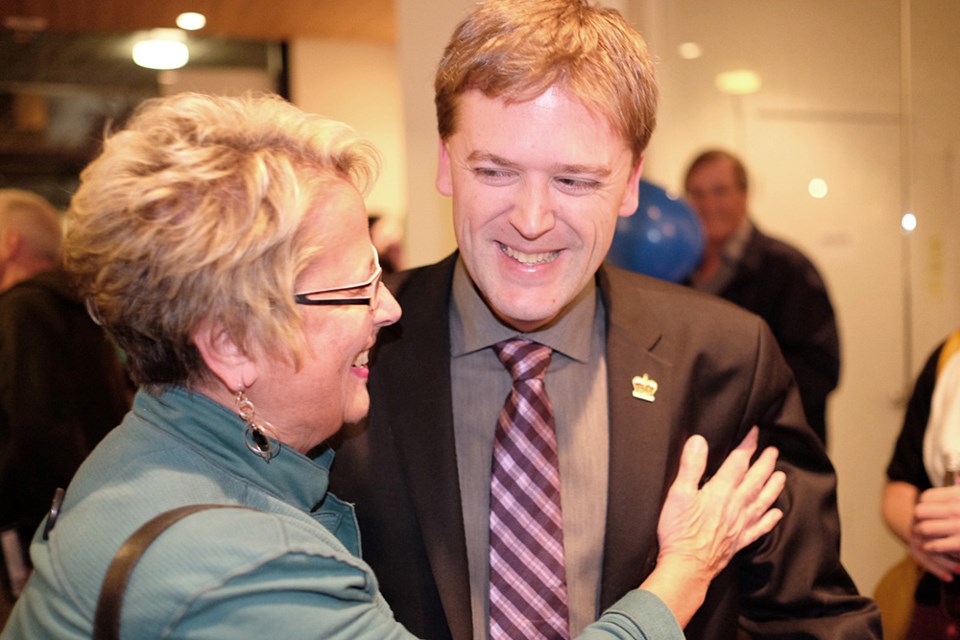Casey Cook is a veteran of New Westminster’s election wars. He’s won four elections to be on city council, serving 12 years. He ran unsuccessfully for mayor in 2005, and is about to enter his 10th year as a school trustee having been elected three times.
All of the board of education campaigns, he claims, were on his own dime. No corporate donations, no trade union donations and no endorsement from the New Westminster and District Labour Council.
“Not that that’s important, I’m just saying it buttresses what I believe,” said Cook, whose Elections B.C. declaration in 2014 showed he paid all of his $2,328 campaign expenses.
What he believes is there should be a ban on corporate and union donations for civic election campaigns. The provincial NDP government recently announced a bill to end corporate and union donations for provincial elections. The legislation did not, however, include municipal elections although they fall under provincial jurisdiction.
A resolution calling for similar financial handcuffs to be put on municipal campaigns is expected to be discussed at the Union of B.C. Municipalities (UBCM) convention in Vancouver this week.
“I’ve seen in the press where some people say donations don’t influence decisions, flat out they do. And anybody that says differently is naive, or simply not being realistic,” said Cook. “There’s plenty of cases that show that donations influence decision outcomes. It simply needs to stop.”

He’s a bit baffled why the NDP didn’t include municipal elections in the legislation.
“If they find those should be the standards and the norms for themselves, it’s hard to understand how they believe that should not be extended to local government,” said Cook.
The bill also includes provision for the province to subsidize candidates to the tune of $2.50 per vote, something Cook opposes on principle.
“It’s difficult to see how that might be extended to the local level. Somebody smarter than I am may figure that out, but that’s a little difficult to understand how that might play out at the local level,” said Cook.
Forcing civic candidates to be basically self-financed with donations from individuals might make it difficult to attract candidates, Cook admitted. But he believes it’s worth changing the rules.
“The kind of money that is spent on elections is very, very off-putting. I know there’s no solution that resolves everything, but there are definitely issues to consider about how, where financing is a challenge, how they can get into politics. That is something to be considered. But getting money on votes doesn’t resolve that either,” said Cook.
Mayor Jonathan Cote has won four elections, three to become city councillor before successfully ousting incumbent Wayne Wright in 2014. To get elected three years ago he collected nearly $61,500 in contributions. Corporate donations totalled $8,700 and unions pumped in $16,700. He managed to collect $34,470 in individual donations.
Cote said the provincial legislation should be extended to municipalities.
“No doubt it would change how local campaigns are financed, and it would likely mean that local campaigns would become much, much smaller,” said Cote. “Overall, it would be in the best interests of democracy and getting the public’s trust. To me, I’ve always been supportive of these types of changes, and I would encourage the provincial government to provide clarity as quickly as possible.”
Cote doesn’t buy the argument corporate and union donations sway council votes. Perception may be the reality, though.
“I don’t necessarily fully agree those donations ultimately have a big influence, but if they do in a reduction in public trust or to cynicism, ultimately, that hurts our democratic process. British Columbia has lagged behind many other jurisdictions across the country when it comes to electoral finance reform, and I think it’s time for us to catch up,” said Cote.
“I’m going to be very supportive of the motion that appears to be coming forward at the UBCM. The provincial government’s focus was on the work they’re doing, but given the province has control of electoral finance at municipal elections, to me it would seem natural that the types of changes they’re talking about and thinking about would also apply there. Given we’re one year (Oct. 20, 2018) away from a municipal election, I think it’s only fair they provide clarity on all those changes so all of the individuals considering running in the next municipal election know what the rules are ahead of the time.”
Cote said elimination of corporate and union donations would lead to smaller, grassroots campaigns.
SFU political science professor David Moscrop told The Canadian Press, “There’s no logical reason now or moral justification to not apply it now to the municipal level. It would be ridiculous not to.”



